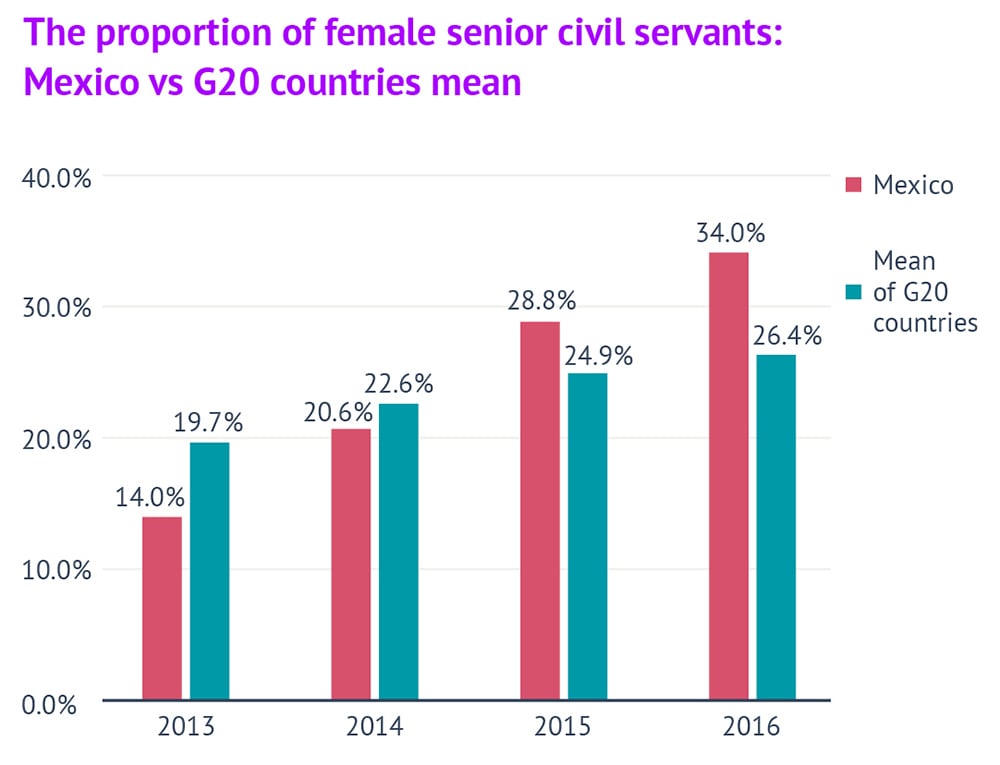Women Leaders Index Gender Equality Case Study: Mexico

Every country has a different story to tell on women leaders in the civil service. Interviewing experts on the findings of our Women Leaders Index – which tracks the proportion of female senior civil servants, national politicians and business leaders in G20 and EU member states – we’ve examined the agenda’s achievements and the remaining obstacles in 11 national case studies
No country has made greater progress on improving the gender balance among its senior civil servants over the last few years than Mexico.
Despite its entrenched patriarchal and macho culture, under the leadership of President Enrique Peña Nieto the country has more than doubled the female representation among its senior public service ranks – from 14% in 2013 to 34% this year. Its rate of growth has outstripped the G20 average by some distance. How has it achieved this?

Mexico’s impressive rate of growth in the proportion of female senior civil servants has seen the country rapidly overhaul the G20 average, climbing from nearly six points behind the mean figure to nearly eight points ahead of it in just three years.

Showing consistent improvements averaging 6.7 points per year, Mexico has outpaced the G20 average increase in the proportion of female civil servants by 4.5 points.
According to Lorena Cruz Sánchez, president of Inmujeres – Mexico’s National Women’s Institute – making gender equality a priority state policy was a crucial milestone.
“Thanks to the commitment and political will of our president, for the first time in the history of Mexico the gender perspective was established as a transversal strategy in our National Development Plan,” she says.
From within this framework, in 2013 came the National Program for Equal Opportunities and Non-Discrimination Against Women (Proigualdad), which is compulsory and affects the executive, legislature and judiciary, as well as the three government orders – federal, state and municipal.
The program has six strategic cross-cutting objectives, 36 strategies, and 314 specific lines of action to promote equality and the representation of women in various decision-making positions.
Like France, Mexico has also adopted the principle of “parity”. Adding this principle to the Federal Constitution and two electoral laws for the registration of candidates in Federal and State Congresses has seen the proportion of women elected to the Lower House rise to 42.2%. This will be closely monitored going forward by a new national Observatory of Political Participation of Women in Mexico, along with 32 local observatories – all of which should be established by August 2017.
The Peña Nieto administration has also established the Mexican Standard on Labor Equality and Non-Discrimination, which certifies public and private workplaces that meet minimum standards on numbers of women workers, women’s representation in decision-making positions, equal pay and tackling workplace violence. One of the criteria is for organisations to have 40% women in management positions.

Lorena Cruz Sánchez, President, Inmujeres
In order to lead by example, and to inspire the private and social sectors, the president instructed all departments within the Federal Public Administration to become certified. Sopme 80% of all Cabinet central units have so far achieved the standard, and state and municipal governments are following suit.
Cruz Sánchez is confident that Mexico’s progress will continue: “Mexico has realised that economic development and social progress are impossible without the full incorporation of women,” she says.
She adds that in Mexico today, women are “just as prepared as men, and there are many who can be ministers of defence, interior, finance, infrastructure; and can be presidents”.
“I am sure that their knowledge, experience and vision as women would improve many of the problems facing our societies.”
Click here for the full results of Global Government Forum’s 2016-17 Women Leaders Index
Or click through to our case studies on Australia, Canada, Finland, France, Germany, Ireland, Italy, Malta, Turkey and the UK.





















